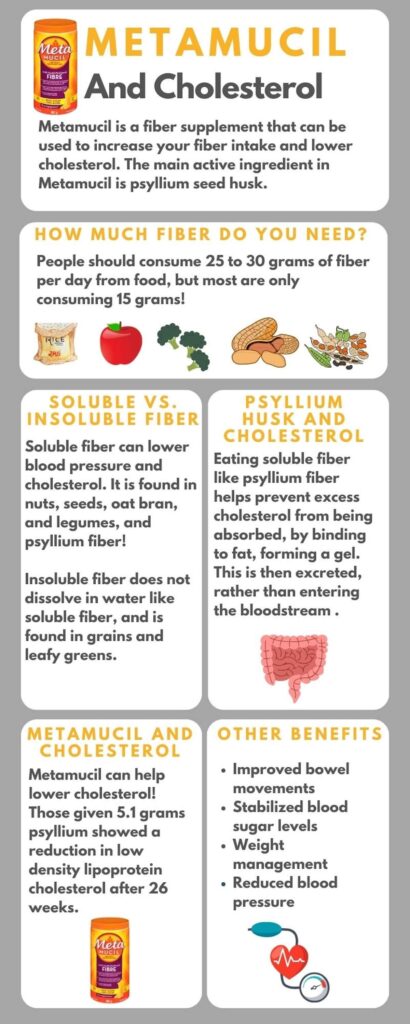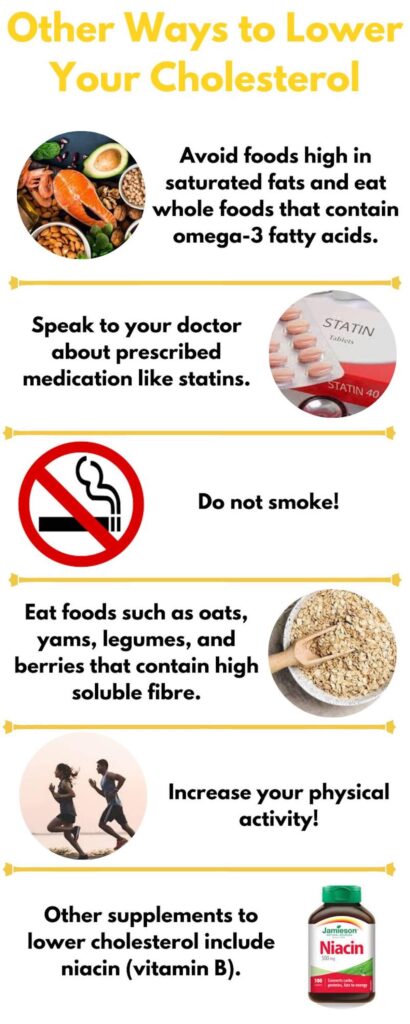Are you looking for things to ADD something to your diet to help lower cholesterol? Does Metamucil sound interesting to you? You may have seen the benefits of Metamucil in a recent advertisement and may be wondering How Does Metamucil Lower Cholesterol?
Well, you are in the right place, as we are going to dive into this question!
Your body needs cholesterol to survive to build cellular structures, regulate bodily processes, and serve in the formation of vitamin D (1). But too much circulating total cholesterol can put you at higher risk of heart disease, heart attack, and stroke.
Managing cholesterol is important and can be done in a variety of ways including the foods we eat (like low cholesterol foods), supplements we take, stress, physical activity, and medications.
Let’s particularly look at how Metamucil can help lower our LDL cholesterol levels.
*Please note that this post contains clearly identified affiliate links. If you click on these links and choose to make a purchase, I may receive a commission (at no cost to you). As an Amazon Associate, I earn from qualifying purchases.
Top Takeaways
- Metamucil is a fiber supplement containing psyllium seed husk, which is a soluble fiber derived from the Plantago ovata plant. Soluble fiber helps lower LDL cholesterol levels by binding with cholesterol and excreting it from the body.
- Metamucil offers various health benefits, including improving bowel movements, stabilizing blood sugar levels, aiding in weight management, and potentially reducing blood pressure.
- When taking Metamucil, it’s recommended to consume at least 3.5 tablespoons of psyllium husk per day, ideally 15 minutes before a meal with a full glass of water, to support cholesterol reduction. Be sure to consult with a healthcare professional before making any dietary changes or taking Metamucil, as it may interact with medications and cause side effects like bloating and diarrhea.
- Top Takeaways
- What Is Metamucil?
- Metamucil And Cholesterol
- The Science Behind Psyllium Husk Lowering Cholesterol
- Research To Support Metamucil And Cholesterol Reduction
- Other Health Benefits Of Psyllium Husk
- How To Incorporate Metamucil For Cholesterol Into Your Diet
- Potential Side Effects Of Taking Metamucil To Lower Cholesterol
- When Not To Take Metamucil For Cholesterol Control
- Final Thoughts
What Is Metamucil?
Metamucil is a fiber supplement that is used to increase your fiber intake. It has been shown to aid in heart health through its ability to lower cholesterol. The active ingredient within Metamucil is called psyllium seed husk, which is a plant based dietary fiber that comes from the Plantago ovata plant.
This type of fiber is called soluble fiber. This soluble fiber is the active ingredient that lowers LDL levels of cholesterol, just like what is found in oatmeal and oat bran, and these top 39 foods to unclog arteries (essential parts of the Portfolio diet).
When Metamucil first started it was originally used as a laxative and created for those who experienced constipation. Nowadays it still is used as a popular method for relieving constipation, however studies have revealed that it can be beneficial in other ways.
These benefits include supporting healthy blood sugar, controlling appetite, and of course reducing cholesterol.
Metamucil And Cholesterol

North Americans should be consuming 25 to 30 grams a day of dietary fiber in the form of food, according to the American Heart Association (2). And more specifically should be aiming for 10 grams of soluble fiber a day to manage lipid levels according to the portfolio diet.
It might be a surprise to find out that only half of that is actually being consumed by Americans, with an average intake of only about 15 grams of fiber a day (3)!
One of the reasons people aren’t getting enough fiber is because of the increased consumption of processed foods, and reduction of whole foods (like vegetables, fruits, whole grains, legumes, nuts and seeds).
The problem with processed foods (think instant oatmeal instead of steel cut oats) is that they are deficient in fiber and instead abundant in starches, sugars, saturated fats, sodium, and cholesterol which increase the risk of developing heart disease and other chronic diseases like diabetes.
Soluble And Insoluble Fiber
Wondering what the difference is?
Soluble fiber is a type of dietary fiber that dissolves in water and is capable of lowering blood glucose and blood cholesterol (4). This viscous soluble fiber is found in foods such as oat bran, nuts, seeds, lentils, and beans.
Soluble fiber is also found in psyllium fiber which, if you remember, is the main ingredient in Metamucil!
Insoluble fiber on the other hand does not dissolve in water and is responsible for aiding in digestion by promoting regularity within the intestines. Foods containing insoluble fiber include wheat products like bran, quinoa, brown rice, and leafy greens (4).
The Science Behind Psyllium Husk Lowering Cholesterol
Digestion begins in the mouth where fats are stimulated by digestive enzymes and emulsifiers, where the goal is to break down fats into small droplets. Once in the stomach, fat is isolated from the other food components and the small intestine emulsifies and digests them with bile acids and more enzymes (5).
Absorption of fats occurs by intestinal cells, but eating soluble dietary fiber helps to prevent excess cholesterol from being absorbed into the bloodstream by binding with it and forming a gel-like complex.
This thick gel is then excreted from the body (when you poop!), effectively reducing the amount of cholesterol circulating in the bloodstream. By increasing our intake of dietary fiber, we can support this natural mechanism and lower our risk of having too much cholesterol in our bloodstream, which is associated with various cardiovascular problems (6).
Research To Support Metamucil And Cholesterol Reduction
Now we know how soluble fiber reduces cholesterol, but can Metamucil lower cholesterol?
Well, a study conducted by Anderson et al., was a double-blind placebo-controlled study examining the long-term effects of psyllium on cholesterol-lowering in hypercholesterolemia patients.
Individuals either received 5.1 grams of psyllium or a placebo twice a day for 26 weeks. The results showed that the “bad” low density lipoprotein cholesterol concentrations were significantly lower in men and women only when taking the psyllium and not in the placebo group.
Thus this research suggests that psyllium is an effective addition in combination with a healthy diet, and may be an alternative to drug therapy like statin drugs (7).
Other Health Benefits Of Psyllium Husk
Improved Bowel Movements
The psyllium husk in Metamucil is also beneficial in treating digestive system irregularities like diarrhea and constipation for improved digestive health.
The psyllium works to push waste through the digestive tract by forming gel-like substances with the food. In doing so, it traps water within the intestine and increases flow of water in the colon, allowing you to excrete waste with a more formed bowel movement and thus helps to manage constipation (8).
Stabilizing Blood Sugar Levels
The soluble fiber psyllium has properties that can reduce glycemic (or blood sugar) response as demonstrated in studies with type 2 diabetic patients (9).
In this study patients living with type 2 diabetes were given 7.0 grams of psyllium 15 minutes before lunch and 3.5 grams 15 minutes before dinner for 8 weeks. There was a significant reduction in blood sugar biomarkers such as A1C and insulin level (9).
Metamucil also has a low-glycemic index, which means sugar is absorbed into the blood stream at a much slower rate, preventing spikes in blood sugar levels.
Weight Management
Psyllium works to manage weight by controlling appetite and increasing fullness to prevent overeating (10).
Overall dietary fibers promote satiety but specifically psyllium can reduce gastric emptying and slow the rate of absorption of fat and glucose from the stomach to the bloodstream to make you feel full for longer (10).
Reduced Blood Pressure
Psyllium can lower blood pressure because it can prevent the build-up of cholesterol within arteries and thus more blood can flow through the arteries due to reduced pressure surrounding the artery. This should be added to the 39 foods to lower blood pressure!

How To Incorporate Metamucil For Cholesterol Into Your Diet
It is recommended to take at least 3.5 Tbsp of psyllium husk per day to support cholesterol lowering as per the Portfolio diet if you do not consume any other form of soluble fiber throughout the day.
Metamucil can be taken anytime of the day, however for cholesterol lowering benefits, it is best to take it roughly 15 minutes before a meal so that it kicks in once you have eaten. It should also be taken with a full glass of water.
It is also best to avoid taking Metamucil with any medication as psyllium husk has the potential to interfere with medications if taken at the same time.
Products: Metamucil For Cholesterol Reduction
1. Powders

2. Capsules

3. Gummies

4. Biscuits
Tips On Taking Metamucil Safely
1. Ensure you are taking it with enough liquid (8 ounces/ 240 ml), preferably water, as it can potentially cause choking without it.
2. Do not take more than the recommended amount given to you, and please speak with your medical professionals (doctors, dietitian, pharmacist) before adding this to your plan.
3. Psyllium in Metamucil has been seen to prevent absorption of some medications, so it is recommended to either take the medications at least 2 hours before or after taking Metamucil.
Recipe Ideas
There are so many fun ways you could add Metamucil into your favorite snacks and meals.
Potential Side Effects Of Taking Metamucil To Lower Cholesterol
Some potential side effects include bloating, abdominal cramping, gas, and diarrhea.
Another one to consider is lack of other nutrients. This is because Metamucil is not a whole food and therefore lacks other nutrients that can support heart health like potassium, magnesium, and calcium.
Thus make sure to add these minerals through foods to your diet throughout the day to stay in line with the recommendations from Mediterranean diet, DASH diet, MIND diet, post stent diets, PAD diet, and lower cholesterol diet.
If any side effects continue, please seek professional health advice from your doctor.
When Not To Take Metamucil For Cholesterol Control
You should not take Metamucil if you are allergic to psyllium, or if you are dehydrated, as it can cause further issues to bowel regulation or can cause choking.
Also, check interactions with medications before taking Metamucil to ensure no interferences. The best way to do this is check with your health care providers before starting a supplement like Metamucil.

Final Thoughts
How does Metamucil lower cholesterol has been answered in this article. Thus, you have now learned that soluble fiber, specifically psyllium, is an incredible tool that can benefit the body in many ways such as managing cholesterolto prevent and or manage cardiovascular disease.
Metamucil is a psyllium supplement you can begin to introduce into your life while still practicing other cholesterol-lowering activities like avoiding high saturated fat foods, exercising, not smoking, and eating soluble fiber-containing foods. If you do all this, you will be headed in the right direction for a heart healthy life!
As always, do not make any major dietary and lifestyle changes without consulting a healthcare professional first.
What do you think? Will Metamucil lower your cholesterol?
This article was written by Christina Taptelis Nutrition Student, and Veronica Rouse, MAN, RD, CDE.






